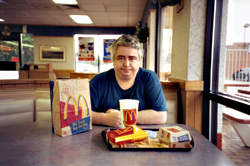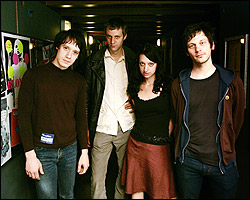The sound of a cassette stopping (“whirl, hiss, click”) punctuates every scene of this artful documentary. Clever move on the part of director Jeff Feuerzeig—the film depicts the life and career of manic- depressive indie folk-pop cult hero Daniel Johnston, whose preferred medium was the audiotape. He conducted correspondence with friends and family by cassette, and, more importantly, he home-recorded his simplistic but soaring songs that way, too. In fact, as one Austin Chronicle music critic remembers in Devil, if he needed two copies of a set of songs to give to two different people, he didn’t dub off an extra tape, he sang, played, and recorded the songs twice.
Johnston didn’t do much the easy way. The first half of Devil features some of the meticulously edited, and often quite good, Super 8 films he made in the ’80s as a high-school student. His proto–special effects were inventive and entertaining, but as the film progresses, his diligence and vision begin to feel more like weights and less like gifts. Soon, Johnston has literally run off with the circus.
It’s the circus that drops him in Austin, Texas, and it’s in Austin, Texas, where Johnston really becomes Daniel Johnston. When an MTV crew shows up at a house party, Daniel does his emerging/awkward singer-songwriter thing, and, oddly enough, a star is born. In the months that follow, Johnston is voted best folk artist and best singer-songwriter by the Chronicle—and keep in mind we’re talking about Austin here, home to a lot of really good musicians. I don’t mean to imply that Johnston didn’t deserve the honor, or any of the others that have been bestowed upon him. I don’t need to imply it, because many music fans will come right out and say it.
Johnston’s place in modern music history rubs many the wrong way. Not Kurt Cobain; he wore a Daniel Johnston T-shirt so often that he’s now credited with much of the singer’s popularity. And not the Butthole Surfers, Sonic Youth, or Simpsons creator Matt Groening. They’re all very big fans. But Johnston’s nursery rhyme–ish, naive, and sometimes grossly honest Beatles-inspired pop songs turned off an equal number of people. (Those not familiar with his sound might know the Target commercial with Mary Lou Lord’s cover of “Speeding Motorcycle.”)
But Devil doesn’t focus on Johnston’s somewhat controversial “outsider artist” identity. It chronicles the downward spiral of his mental faculties—the both gorgeous and troubling results of his complicated mind. Interviews with family and friends help us understand him, as does vintage and contemporary concert footage. But it’s in simply viewing his drawings and paintings while listening to the soundtrack—made up of all Johnston songs, of course—that you best see who Johnston is: troubled, yes; visionary, very much so.








